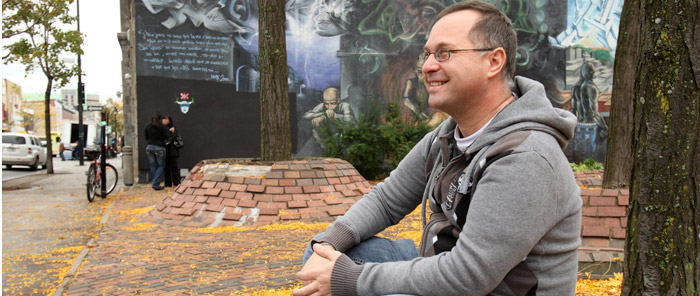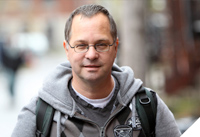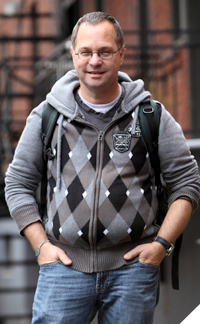 MUHC clinical nurse specialist works with some of society’s most vulnerable patients
MUHC clinical nurse specialist works with some of society’s most vulnerable patients


Jacques Fallu, a clinical nurse specialist at the MUHC’s Immunodeficiency Clinic, hard at work.
Jacques Fallu, a clinical nurse specialist at the MUHC’s Immunodeficiency Clinic is happy to make house calls – but that’s not always easy. Fallu does health follow-ups with the most vulnerable patients at the clinic – IV drug users with HIV and, in many cases, hepatitis C. Sometimes, just locating his patients can be a challenge. Some live on the streets, and some are in jail. Some just seem to disappear.
“Sometimes they die because of drug use or HIV-related health problems,” says Fallu. “Or, they simply can’t be found. When I do connect with them, I talk with them about their health, and I tell them to call me any time because I can help them. We cannot do a great deal for some of our patients, but we can help them to be as well as they can be.”
“Because most of my patients don’t want to come to clinics, I go to them. Of course, we can do much more for them in our clinic, but I can do basic care – blood tests and dressings and so on – at their homes. I help them take their medication regularly, work with pharmacy groups to assist them, and often deal with social issues as well. I try to build rapport and establish trust, so they will let me help them.”
Fallu functions both as a nurse and as a social worker because it is better for his patients to have a single contact. When dealing with more complex psycho-social issues, he consults with a social worker on the team. One common issue is dementia. Even though many patients are quite young, HIV can lead to cognitive problems earlier than in the general population. “Just finding places for these patients to live can be a real challenge,” he says. “Some patients are in stable health, but their psycho-social issues are terrible. It’s better for me to keep these patients in my caseload, because otherwise they will get sick again.”
While the majority of Fallu’s patients live in Montreal, some are as far afield as Joliette. They leave Montreal to decrease their drug use, but find drugs in their new setting as well. Whenever possible, Fallu keeps in touch with them, follows up and encourages them to come to the clinic every three or four months.
There are successes. Fallu teaches his patients harm reduction techniques to avoid drug-related infections. Some eventually stop taking drugs, or take them only rarely. These changes in behaviour can help significantly slow the progression of HIV and hepatitis C-related health problems. For his dedicated work, Fallu received the prestigious 2011 Prix Florence in the area of disease prevention, awarded each year by the Quebec Order of Nurses for outstanding professional achievement.
Fallu has been working with the HIV Outreach Program since 2001. Trained in the field of drug addiction, he has developed an extensive set of contacts with community agencies, other hospitals and other outreach programs. Most of all, he has built a rapport with some of the most difficult and hard-to-reach patients in the province. “It can be difficult and sad sometimes – but I love my work.”